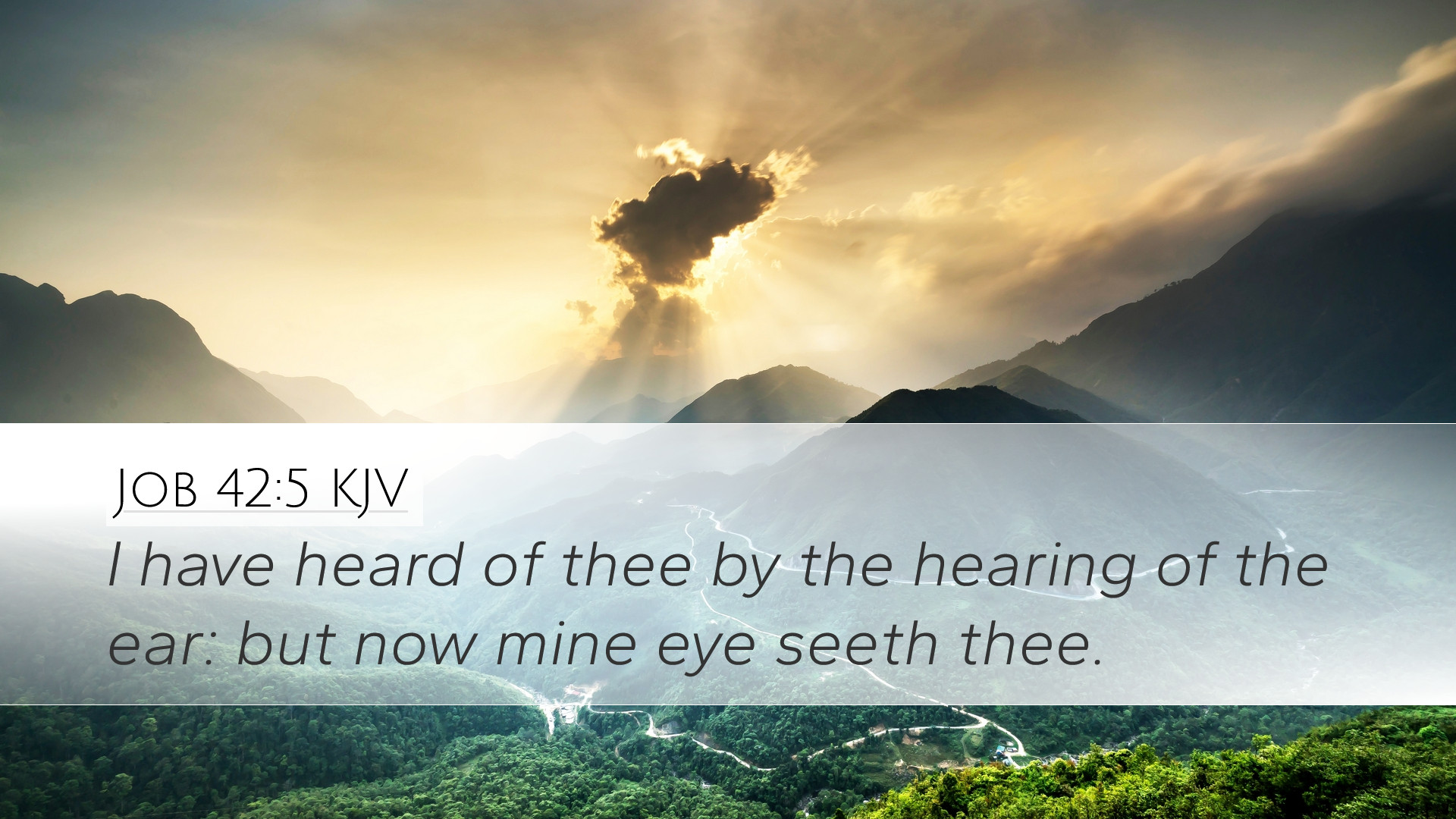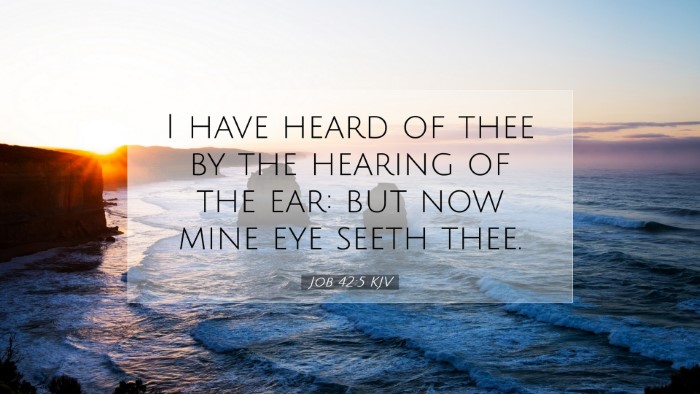Old Testament
Genesis Exodus Leviticus Numbers Deuteronomy Joshua Judges Ruth 1 Samuel 2 Samuel 1 Kings 2 Kings 1 Chronicles 2 Chronicles Ezra Nehemiah Esther Job Psalms Proverbs Ecclesiastes Song of Solomon Isaiah Jeremiah Lamentations Ezekiel Daniel Hosea Joel Amos Obadiah Jonah Micah Nahum Habakkuk Zephaniah Haggai Zechariah MalachiJob 42:5
Job 42:5 KJV
I have heard of thee by the hearing of the ear: but now mine eye seeth thee.
Job 42:5 Bible Commentary
Job 42:5 - Commentary Summary
Verse: "I have heard of You by the hearing of the ear; but now my eye sees You."
This verse is one of the climactic moments in the Book of Job, marking Job's transition from suffering to revelation. It encapsulates Job's journey from a second-hand knowledge of God through what he had heard, to a profound personal encounter with the Divine.
Contextual Overview
The Book of Job explores deep questions about suffering, justice, and faith. Throughout the dialogues, Job struggles with understanding his immense suffering and the seeming absence of God. His friends attempt to explain his plight through traditional wisdom, failing to grasp the complexity of God's governance in the world.
Insights from Commentaries
Matthew Henry's Commentary
Matthew Henry emphasizes the shift in Job's understanding. Initially, Job had a general knowledge of God based on external observations and the teachings of others. However, through his suffering and subsequent divine encounter, he comes to a deeper realization. Henry notes:
- “Knowledge begins in the ear but must culminate in the eye.” This highlights the importance of personal experience in faith.
- Job’s statement reflects a transformative experience; he transitioned from knowledge of God to an intimate understanding.
This encounter demonstrates that true knowledge of God is founded on personal experience rather than mere hearsay.
Albert Barnes' Notes
Albert Barnes provides a thoughtful exposition on the implications of Job's personal revelation. He points out:
- “Before, Job's perception of God was through the lens of human speech and human understanding.”
- “Having seen God, Job understands a deeper truth: that God’s ways are beyond human comprehension.”
Barnes argues that this change in Job’s perspective reinforces the idea that true theological insight often arises from profound personal struggles. Job learns to see God's grandeur and sovereignty, moving beyond surface-level understanding.
Adam Clarke's Commentary
Adam Clarke highlights the relationship between suffering and revelation. He asserts that Job’s experiences have refined and purged his understanding:
- “The sufferings of the righteous often lead to a greater vision of God's nature.”
- Clarke posits that through his trials, Job was brought to a closer communion with God.
This intimate knowledge is characterized by a visual, experiential understanding rather than an academic or intellectual grasp. Clarke points out that seeing God implies an understanding of His attributes — His justice, mercy, and omnipotence — in a way that is lived and felt.
Theological Implications
This verse prompts profound theological reflections. The shift from "hearing" to "seeing" symbolizes a wider principle in the believer's life: the notion that faith is not merely a passive acceptance of information but an active engagement with God. It suggests:
- Experience of God: Genuine faith grows out of personal experience rather than mere doctrine.
- The Role of Suffering: Difficult times may be divinely ordained to lead to deeper insights.
- The Nature of Revelation: God often chooses to reveal Himself in unexpected ways.
Practical Application for Pastors and Theologians
This verse serves as a reminder of the transformative power of experiencing God personally. Pastors and theologians should consider:
- Encouraging Personal Encounters: Ministry should emphasize teaching that nurtures personal encounters with God rather than solely imparting knowledge.
- Addressing Suffering: Addressing congregational suffering with sensitivity and highlighting how God can bring revelation through trials.
- Facilitating Spiritual Growth: Creating environments where individuals can share their experiences of God, fostering a community of faith that genuinely knows Him.
Conclusion
Job 42:5 is not merely a statement of understanding but a profound declaration of faith that invites deeper reflection on one's own relationship with God. The insights gleaned from public domain commentaries remind us that the journey to understanding God is filled with trials, personal revelations, and ultimately leads to an eye-opening experience of His presence. This profound truth is an anchor for the faithful, guiding them through the complexities of life with the assurance that God is indeed knowable and relatable in ways that go beyond mere human words.


